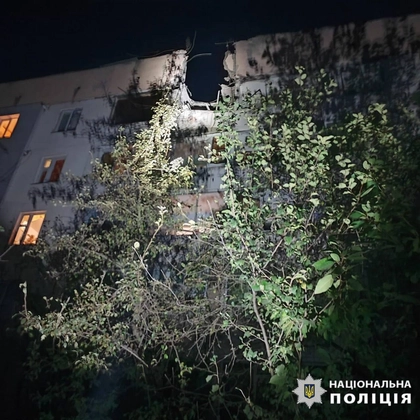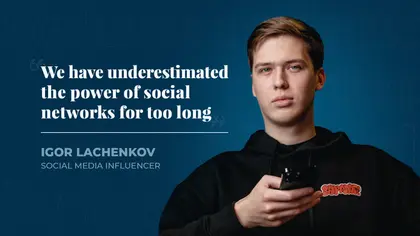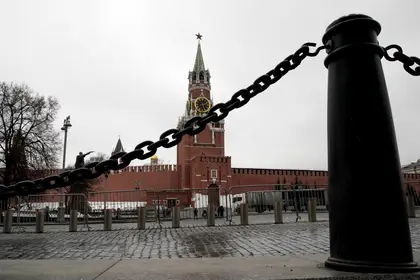Russia’s full-scale invasion transformed almost every aspect of life in Ukraine but one that is less obvious to outsiders is the role that some of the country’s social media influencers now play in informing Ukrainians on the progress of the war.
One of the most popular is 23-year-old Igor Lachenkov, better-known as “Lachen Writes”. Before the invasion he wrote a small blog reporting on local news events in his hometown of Dnipro. On 10 January 2022, as Russian troops massed on the borders of Ukraine and tensions rocketed, he decided to create a Telegram channel to report on the situation.
JOIN US ON TELEGRAM
Follow our coverage of the war on the @Kyivpost_official.

Since then, he has attracted over a million subscribers for his timely and potentially life-saving updates on all aspects of the conflict. His avid readers are able to follow his analysis of the war, view uncensored videos from the military and reports on the threat from missile attacks - which now include probable targets and anticipated time of arrival.
In an exclusive interview with Kyiv Post, Lachenkov discusses the "behind the scenes" running of the channel and how cooperation with Ukrainian special services has made the integration of information, psychological special operations against Russians and timely updates of the situation for Ukraine.
At the beginning of the full-scale invasion, there was a lot of disinformation, so how were you able to check the truthfulness of information sources? Has the spread of false information reduced?

Kyiv Hit by Massive Drone Attack as Russian Strikes Target Multiple Ukrainian Cities
Yes, at the beginning of the invasion, there were really many fakes. But we used our contacts to check information very carefully. We always tried to identify people who had witnessed an event and we also have a lot of friends at the front. For global news, we refer only to official sources.
We made some, thankfully few, mistakes. Now, we have such a good relationship with our audience that they immediately inform us if they notice something inaccurate or suspicious.
How do you manage to post news so quickly? Do you have a permanent team and are they paid?
Obviously, the channel has grown so much I can’t run it on my own. Initially I had a friend who helped out occasionally but within six weeks or so he had to start working full-time. A short time afterwards another friend came on board. So, now there are three of us and we receive a salary paid for by advertisements and some donations.

What does your work schedule look like and how are responsibilities distributed?
There is no formal schedule as such. We try to ensure that at least one of us is “on duty” at all times. We warn each other if we’re going to be off-line for a while and, while we try to sleep at night, we’re are all night owls so work to the early hours.
I start at around eight in the morning, watch the news, post something, and then try to sleep for a while. In case of an emergency, I will get a call and get the team together. We have a separate chat where we decide who posts what. At the moment the three of us can cope, but I think that over time we will have to increase the size of our team.
How is the channel funded?
We make money through advertisements, although we don’t post many on the main channel. We also have an entertainment channel “Bro skynuv mem” ("Bro dropped the meme"), where we publish most of our advertising which we try to publish as “news”. We don’t advertise such things as casinos, alcohol, tobacco etc.
How many requests do you receive for help raising funds for the military?
A lot. I pass the information on to another colleague who will verify if a request is genuine or not. Once we have confirmed it’s real, we include it in our database and will decide on the most urgent cases in consultation with our military contacts who know the hottest destinations and where help is most needed.
How successful are your fund-raising appeals?
Our audience is extremely generous. In juat three days last year, we collected 600m hryvnias ($16.2m) which funded four Bayraktar TB2 drones. Between September and December, we collected 46 cars, 28 drones, 16 generators, 30 thermal imagers, one anti-drone gun, 10 headphones, 10 walkie-talkies, car repairs for four million hryvnias, equipment for snipers and one million hryvnias worth of uniforms.
Under Ukrainian law, charitable foundations have the right to keep 20% of donations. Do you exercise this right?
We don't use it and we don't have a foundation. I only recently added myself to the register of volunteers. I don't really approve of this law. Some of the larger funds are sponsored by large businesses who cover all their operational activities with donations. Some say that the small funds can only exist by using these funds. I think that a there is not enough transparency in this area and some funds are being misued, so I oppose it.
Do Russians read your channel?
Prior to switching completely to Ukrainian, we know that Russians regularly read our posts. We also know from the negative reactions to our positive news or mocking of our tragedies, that a certain percentage are still reading our output. We also receive private messages from ordinary people, war correspondents, bloggers, and others.
Do you cooperate with the Ukrainian special services and do you conduct information and psychological special operations (IPSO) on the channel?
We were first contacted by the Security Service of Ukraine (SSU) on the day before the full-scale invasion. We sometimes get requests from the cyber police to post information such as warnings of current scams and from the Center for Countering Disinformation for such things as lists of channels managed by the Russian special services or to expose other fakes.
Do you follow Russian Telegram channels?
Of course, I regularly read articles from war correspondents who I know are generally truthful or whose information I can check through our own sources. In fact, OSINT (open-source intelligence) is widely used by us and the enemy.
What are the most opposing narratives that Russia is spreading?
The Russians are now fixated on stopping the provision of western weapons and funds. They portray Ukraine as a corrupt country that will not win the war, because of this and that those countries that provide assistance should pay attention to their own problems rather than to those of Ukraine.
What can we do to strengthen Ukraine's position on the information front?
We have underestimated the power of social networks, such as Twitter, for too long. Users can build their own information agenda and use it to influence the views of the audience. This is something that Russia has exploited for many years and continues to do so. We know that they use “bot farms” that will react within minutes to attack anything they disagree with or reflects badly on them. Therefore, it is important that we quickly learn to disseminate the Ukrainian point of view through social networks.
You recently launched a YouTube channel. What is its purpose what content do you plan?
Initially we are concentrating on our military. In the first video, we highlighted how an individual man who gave all his youth, from 2014 to the present time, to protect the state. We talked about the steps needed to help the individual to return from war back into peace-time society.
In your opinion, what difficulties will Ukrainians face after victory?
First of all, there are likely to be many who are psychologically damaged by the war and we have little or no resources to help them return to a normal life.
Secondly, it will be difficult for many politicians to adjust from the political requirements of war time to the reality of normal life in Ukraine and those issues that were ignored because the war was the priority. While we must guard against a return to the old ways we must also be aware that some of those who proved themselves during the war may not be suitable for peace-time politics.
Thirdly, our politicians must realize that the war is not yet over. The enemy has not been beaten and, indeed, is becoming more aggressive in every area, not least in the use of social media to push its agenda. Even when it does end we have much to do to rebuild our country and remove the scars and remnants of war.
You can also highlight the text and press Ctrl + Enter






